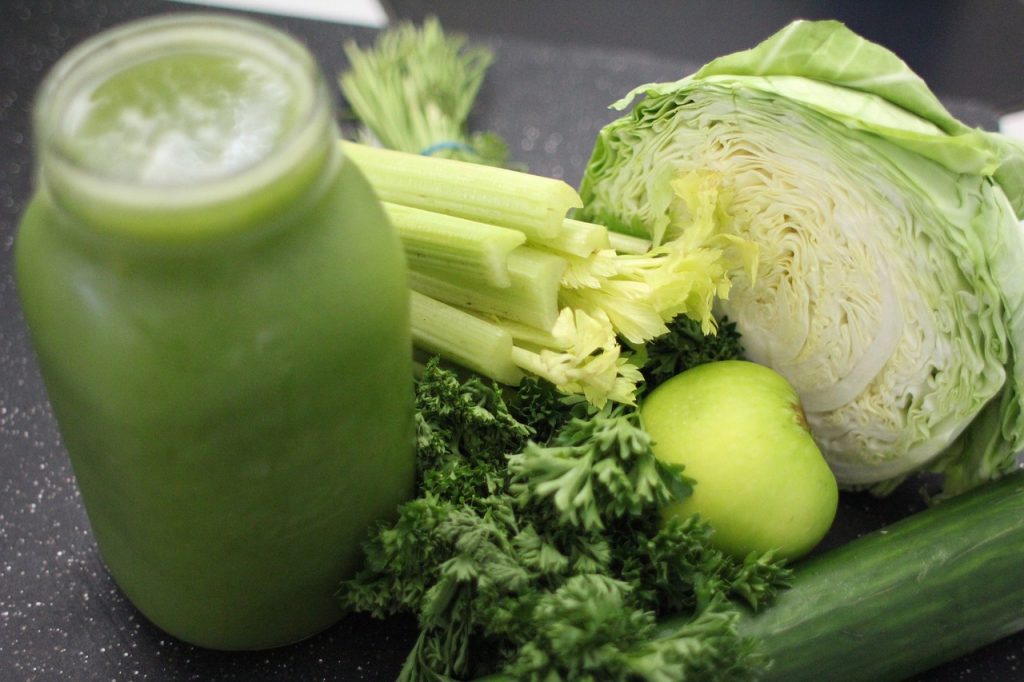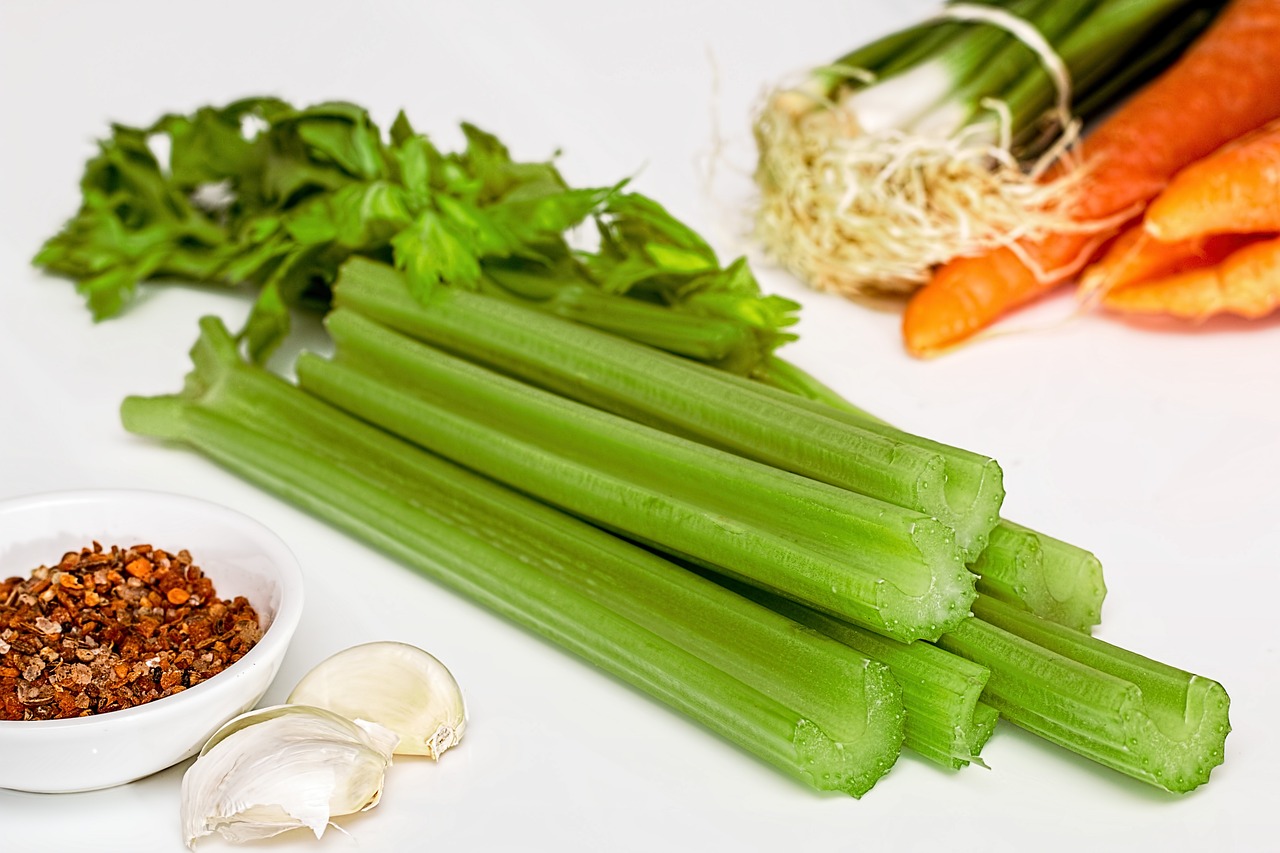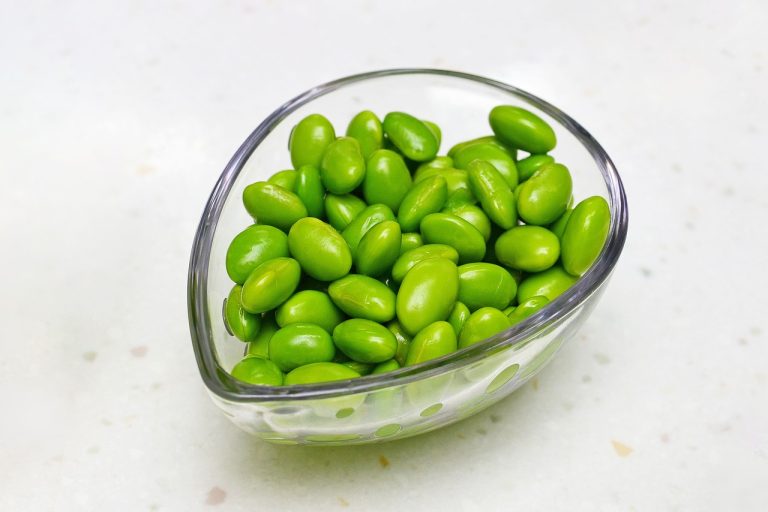Is Celery Low FODMAP? Important Guide For Your Digestive Health!
If you’re following a low FODMAP diet, you may be wondering – is celery low FODMAP and a safe food to eat?
While celery is generally considered a healthy food, it contains some FODMAPs that may trigger digestive symptoms in sensitive individuals.
However, before you rule it out entirely, it is important to know that the serving size and preparation method of celery can affect its FODMAP content.
Is Celery Low Fodmap?

In large quantities, celery is high in FODMAPs. However, you could say that celery is low in FODMAPs only when consumed in moderation—that is no more than 1/3 rd of a stalk (which is approximately 5 cm) or about 10 grams.
What is Celery?
Celery is a type of vegetable that belongs to the Apiaceae family. It’s a crunchy and refreshing vegetable that can be eaten raw or cooked. Celery is a good source of vitamins and minerals, including vitamin K, vitamin C, potassium, and folate. It’s also low in calories and high in fiber.
According to research, celery is fairly low in FODMAPs – but only if you eat it in small portions of less than 5 cm of the stalk.
Here’s a nutrition table for celery:
| Nutrient | Amount per 100g |
|---|---|
| Calories | 16 |
| Carbohydrates | 3g |
| Fiber | 1.6g |
| Protein | 0.7g |
| Fat | 0.2g |
| Vitamin K | 29mcg |
| Vitamin C | 3.1mg |
| Potassium | 260mg |
| Folate | 36mcg |
It’s important to note that while small quantities of celery are low in FODMAPs, it’s still possible to eat too much of it. Eating large amounts of any food can cause digestive discomfort, especially if you have a sensitive digestive system. It’s recommended to stick to a serving size of 1/2 cup (75g) of celery per meal.
Here’s a table for Glucose, Fructose and Excess Fructose per serving suggestion:
| Serving Suggestion | Glucose | Fructose | Excess Fructose |
|---|---|---|---|
| 1/2 cup (75g) of celery | 0.75g | 0.75g | 0g |
Health Benefits of Celery
Celery can provide numerous health benefits. Here are some of the reasons why you should consider adding celery to your diet:
Rich in Nutrients
Celery is a good source of vitamins and minerals, including vitamin K, vitamin C, folate, and potassium. These nutrients can help support your immune system, promote healthy bones, and regulate blood pressure.
High in Fiber
Celery is high in fiber, which can help promote regularity and prevent constipation. A 1-cup serving of chopped celery contains about 1.6 grams of fiber.
May Help Lower Inflammation
Celery contains antioxidants and anti-inflammatory compounds that may help reduce inflammation in the body. Chronic inflammation has been linked to a number of health problems, including heart disease, cancer, and arthritis.
May Help Lower Blood Pressure
Celery contains compounds that may help lower blood pressure. One study found that consuming celery extract for 6 weeks resulted in a significant reduction in systolic blood pressure.
May Help Prevent Ulcers
Celery contains a type of flavonoid called apigenin, which has been shown to help prevent the formation of ulcers in the stomach.
May Help Support Digestive Health
Celery contains natural compounds that may help support digestive health. One study found that celery extract helped protect the lining of the digestive tract and reduce inflammation in rats with colitis.
Overall, celery is a nutritious and healthy vegetable that can provide a variety of health benefits. Whether you add it to salads, smoothies, or soups, celery is a versatile ingredient that can be easily incorporated into your diet.
Also Read: Are Artichokes Low FODMAP
Potential Side Effects of Celery
Celery is a nutritious vegetable that is low in calories and high in fiber. It is also a good source of vitamins and minerals, including vitamin K, vitamin C, and potassium. However, like any food, celery may cause side effects in some people.
Allergic Reactions
Celery is a common allergen, and some people may experience an allergic reaction after consuming it. Symptoms of an allergic reaction may include itching, hives, swelling of the lips, tongue, or throat, and difficulty breathing. If you experience any of these symptoms after eating celery, seek medical attention immediately.
Digestive Issues
Celery is high in fiber, which can be beneficial for digestive health. However, some people may experience digestive issues after consuming celery. This is because celery contains certain types of carbohydrates called oligosaccharides, which can be difficult for some people to digest. If you experience bloating, gas, or diarrhea after eating celery, you may be sensitive to these types of carbohydrates.
Interactions with Medications
Celery contains compounds called coumarins, which can have blood-thinning effects. If you are taking blood-thinning medications, such as warfarin, you should talk to your doctor before consuming large amounts of celery. Consuming too much celery may increase the risk of bleeding.
Conclusion
While celery is generally considered safe for most people, it may cause side effects in some individuals. If you experience any adverse reactions after consuming celery, it is important to speak with your healthcare provider. They can help determine the cause of your symptoms and recommend appropriate treatment.
How to Include Celery in a Low Fodmap Diet

Here are some ways you can include celery in your low FODMAP diet:
As a Snack
Celery makes a great snack on its own or with some low FODMAP dip, such as hummus or peanut butter. Cut celery into sticks and store them in the fridge for an easy and healthy snack option.
In Salads
Celery adds a nice crunch to salads and is a great way to increase your vegetable intake. Try adding celery to your favorite salad recipe, or make a simple celery and cucumber salad with a low FODMAP dressing.
In Soups and Stews
Celery is a common ingredient in many soups and stews. Try adding chopped celery to your favorite soup or stew recipe for added flavor and nutrition.
As a Garnish
Celery can also be used as a garnish for drinks or dishes. Try using celery leaves to garnish your Bloody Mary or add some chopped celery to your favorite stir-fry dish.
Remember that while celery is low in FODMAPs, it’s important to be mindful of portion sizes. Eating too much celery at once can still cause digestive discomfort. Stick to the recommended serving sizes and listen to your body to determine what works best for you.
Overall, celery is a great addition to a low FODMAP diet and can be enjoyed in a variety of ways. Try incorporating celery into your meals and snacks to reap its many health benefits.
Alternatives to Celery in a Low Fodmap Diet
If you are following a low FODMAP diet, you might be wondering what alternatives there are to celery. Celery is a common ingredient in many recipes, but it is also high in FODMAPs, which can trigger symptoms in people with Irritable Bowel Syndrome (IBS) and other digestive disorders.
Luckily, there are many low FODMAP alternatives to celery that you can use in your cooking. Here are a few options:
1. Carrots
Carrots are a great alternative to celery in soups, stews, and other recipes. They are low in FODMAPs and provide a similar crunch and texture to celery. You can also use them as a dipper for hummus or other low FODMAP dips.
2. Cucumber
Cucumbers are another great option for adding crunch and texture to your meals. They are low in FODMAPs and can be sliced and added to salads, sandwiches, and wraps.
3. Bell peppers
Bell peppers are a colorful and flavorful alternative to celery. They are low in FODMAPs and can be used in a variety of recipes, including stir-fries, fajitas, and salads.
4. Green beans
Green beans are a versatile vegetable that can be used in many different dishes. They are low in FODMAPs and can be steamed, roasted, or sautéed.
5. Zucchini
Zucchini is a low FODMAP vegetable that can be used in a variety of ways. It can be sliced and grilled, roasted, or sautéed. It can also be spiralized to make low FODMAP noodles.
Overall, there are many low FODMAP alternatives to celery that you can use in your cooking. Experiment with different vegetables to find the ones that work best for you and your taste preferences.
Frequently Asked Questions
Is celery juice safe for those with IBS?
Celery is considered a low FODMAP food in small quantities, which means it is generally safe for people with IBS to consume in moderate amounts. However, it is important to note that everyone’s tolerance to FODMAPs can vary, so it is best to start with a very small amount and see how your body reacts.
If you are considering drinking celery juice as part of a low FODMAP diet, it is recommended to limit your intake to no more than 1/4 cup (100 ml) per serving. Drinking too much celery juice at once can cause digestive discomfort, such as bloating, gas, and diarrhea.
Additionally, it is important to choose fresh celery and avoid celery that has been processed or packaged with high FODMAP ingredients, such as garlic or onion powder. Always check the ingredient label before consuming any packaged celery products.
Overall, celery can be a healthy addition to a low FODMAP diet, but it is important to listen to your body and adjust your intake accordingly. If you experience any negative symptoms after consuming celery juice, it may be best to avoid it or speak with a healthcare professional for further guidance.

Jane Porter is an architect that like many others, had her life significantly impacted by digestive problems for many year. Trying to find a solution to her digestive problem, she came across the low FODMAP diet, a scientifically-backed approach designed to alleviate symptoms associated with irritable bowel syndrome (IBS) and other digestive disorders.







